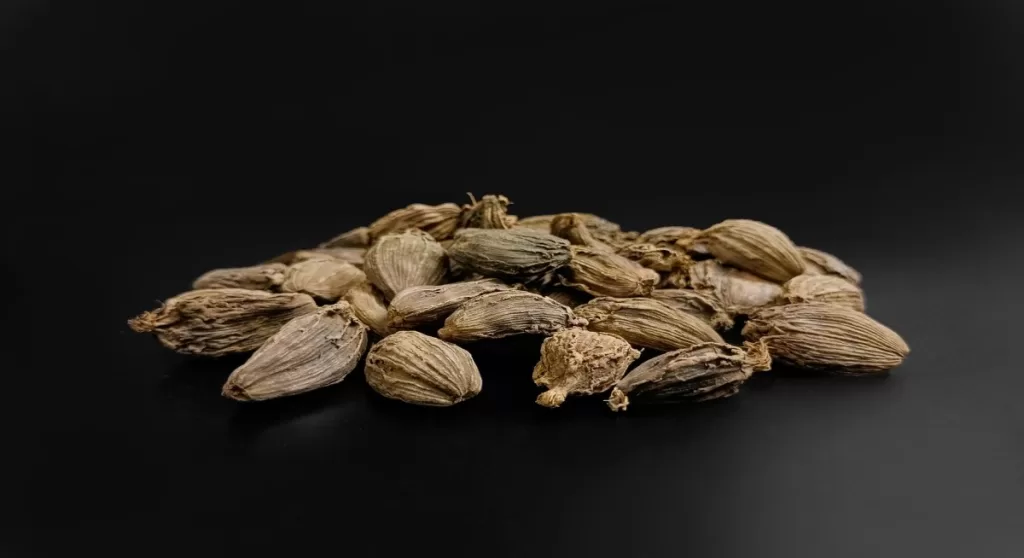What is Black Cardamom
Black cardamom is a spice that comes from the dried fruit of a perennial plant called Amomum subulatum, which is native to the eastern Himalayas and is also grown in some other parts of Asia. Black cardamom is a relative of green cardamom, but it has a distinct smoky, earthy, and slightly bitter flavor that sets it apart. Let’s know about Black Cardamom health benefits:
The dried fruit of the black cardamom plant is characterized by its large size and dark brown color, and it is often used in whole or crushed form to flavor a variety of dishes, particularly in South Asian, Southeast Asian, and Chinese cuisine. It is a popular ingredient in spice blends like garam masala and Chinese five-spice powder, and it is used in dishes such as curries, stews, soups, and rice dishes. In addition to its culinary uses, black cardamom is also sometimes used for its potential health benefits, which include digestive and respiratory support.
What are the health benefits of Black Cardamom?
Black cardamom is often used in traditional medicine and is believed to have several potential health benefits, although more research is needed to confirm these benefits. Some of the potential health benefits of black cardamom include:
- Digestive aid: Black cardamom is commonly used to aid digestion, relieve bloating, and reduce stomach discomfort. It may help stimulate the production of digestive enzymes, which can promote healthy digestion and prevent constipation.
- Respiratory health: Black cardamom has been used in traditional medicine to help relieve respiratory issues such as coughs, asthma, and bronchitis. It is believed to help relax the airways, making it easier to breathe.
- Anti-inflammatory properties: Black cardamom contains compounds that may have anti-inflammatory properties, which can help reduce inflammation throughout the body. This may help prevent or reduce the risk of chronic diseases such as heart disease, diabetes, and cancer.
- Antioxidant properties: Black cardamom is rich in antioxidants, which can help protect the body from oxidative stress and damage caused by free radicals. This may help reduce the risk of chronic diseases and promote overall health.
- Oral health: Black cardamom may help improve oral health by killing harmful bacteria in the mouth and reducing bad breath.
It’s important to note that while black cardamom has potential health benefits, it should not be used as a substitute for medical treatment. If you have a medical condition or are taking medication, it’s important to talk to your healthcare provider before using black cardamom or any other natural remedy.
How to use Black Cardamom for health benefits
Black cardamom can be used in a variety of ways to potentially obtain its health benefits. Here are some ways you can use black cardamom:
- Add it to your cooking: Black cardamom is a popular spice used in many cuisines, particularly in South Asian, Southeast Asian, and Chinese cuisine. You can add black cardamom to stews, soups, curries, rice dishes, and marinades to enhance their flavor and potentially obtain its health benefits.
- Make black cardamom tea: You can make tea by simmering a few crushed black cardamom pods in water for several minutes. This can help soothe digestive issues, relieve respiratory issues, and promote relaxation.
- Use it as a mouth freshener: You can chew on black cardamom pods to freshen your breath and potentially obtain its oral health benefits.
- Take it in supplement form: Black cardamom supplements are available in capsule form and can be taken as a dietary supplement. However, it’s important to talk to your healthcare provider before taking any new supplement.
It’s important to keep in mind that black cardamom should be consumed in moderation, as excessive intake can cause some side effects. Pregnant and breastfeeding women should also be cautious and consult their healthcare provider before consuming black cardamom.
Black cardamom side effects
While black cardamom is generally considered safe for most people when consumed in moderation, there are some potential side effects to be aware of:
- Gastrointestinal issues: Black cardamom may cause gastrointestinal issues such as heartburn, bloating, and stomach discomfort, particularly when consumed in large amounts.
- Allergic reactions: Some people may be allergic to black cardamom, which can cause symptoms such as hives, itching, and swelling.
- Drug interactions: Black cardamom may interact with certain medications, including blood-thinning medications, and should not be consumed without first consulting with a healthcare provider.
- Respiratory issues: In some people, black cardamom may worsen respiratory issues such as asthma, due to its warming and drying properties.
- Unsafe during pregnancy: Pregnant women should avoid consuming black cardamom, as it may stimulate contractions and cause complications.
It’s important to consume black cardamom in moderation, and to talk to a healthcare provider before using black cardamom if you have a medical condition, are taking medications, or are pregnant or breastfeeding.






